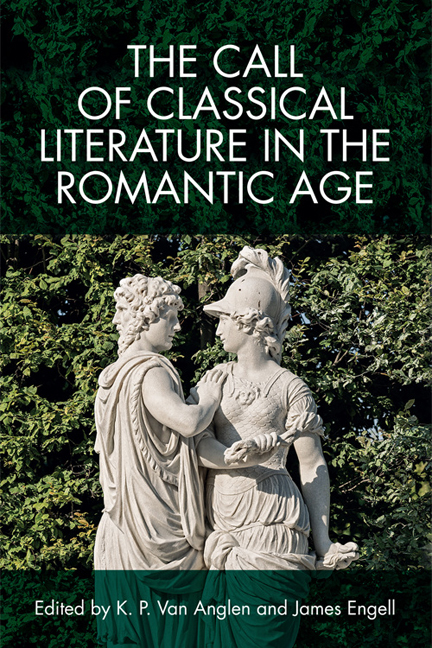Introduction: The Call of Classical Literature in the Romantic Age
Published online by Cambridge University Press: 06 May 2021
Summary
This book reveals the pervasive extent to which, on both sides of the Atlantic, classical texts deeply inform and shape the cultural period we now call Romanticism, a term and period label established only many decades after the end of the era that it describes. Throughout the later eighteenth and earlier nineteenth centuries, the presence of classical texts, genres, values, and attitudes flows strongly through a wide range of authors working in many modes: poetry, history, essays, politics, aesthetics, and life-writing. The classics remain vibrant and appealing as a ready resource. The classics establish a pervasive, essential presence in the literary and cultural fabric of the Romantic period. Far from being inimical to romantic attitudes, classical inheritances often enrich those attitudes. Moreover, the study of Hebrew—designated and studied as a classical language—significantly changes poetry and literary criticism, as well as inflecting political discourse and cultural debate.
Classical strains found in major British poets—especially in Wordsworth, Coleridge, Shelley, Keats, and Byron—have long been recognized and studied. Scholars such as David Fairer, Stephen Gill, Bruce Graver, Nicholas Halmi, James Mays, Jacob Risinger, and others have illuminated the extent to which these poets loved and variously incorporated classical texts and ideas in their own verse, criticism, and letters. The present volume moves beyond and supplements these studies to demonstrate how thoroughly an entire literate culture, one that we now call romantic, exhibited close knowledge of the classics and turned to classical literature habitually as a resource for poetry, the revitalization of genres, historical understanding, biographical presentation, critical principles, and political reform.
Romanticism and classicism, the romantic and the classic, are so habitually paired, primarily by placing them in contrast or opposition, that it has become hard to imagine how thoroughly classical literature permeated and informed what we now call the Romantic Age. In that era, very few writers in Great Britain or America refer to themselves or their contemporaries as romantics, and virtually none of them use the term Romanticism for what William Hazlitt calls “the spirit of the age.” If they seem to quarrel with the classical inheritance that many of them knew so well, their fight is more with the narrowed transmission of that inheritance found in strictures of high neoclassic literary theory that had dominated criticism and practice since the later seventeenth century than it is with classical literature itself.
- Type
- Chapter
- Information
- The Call of Classical Literature in the Romantic Age , pp. 1 - 32Publisher: Edinburgh University PressPrint publication year: 2017



